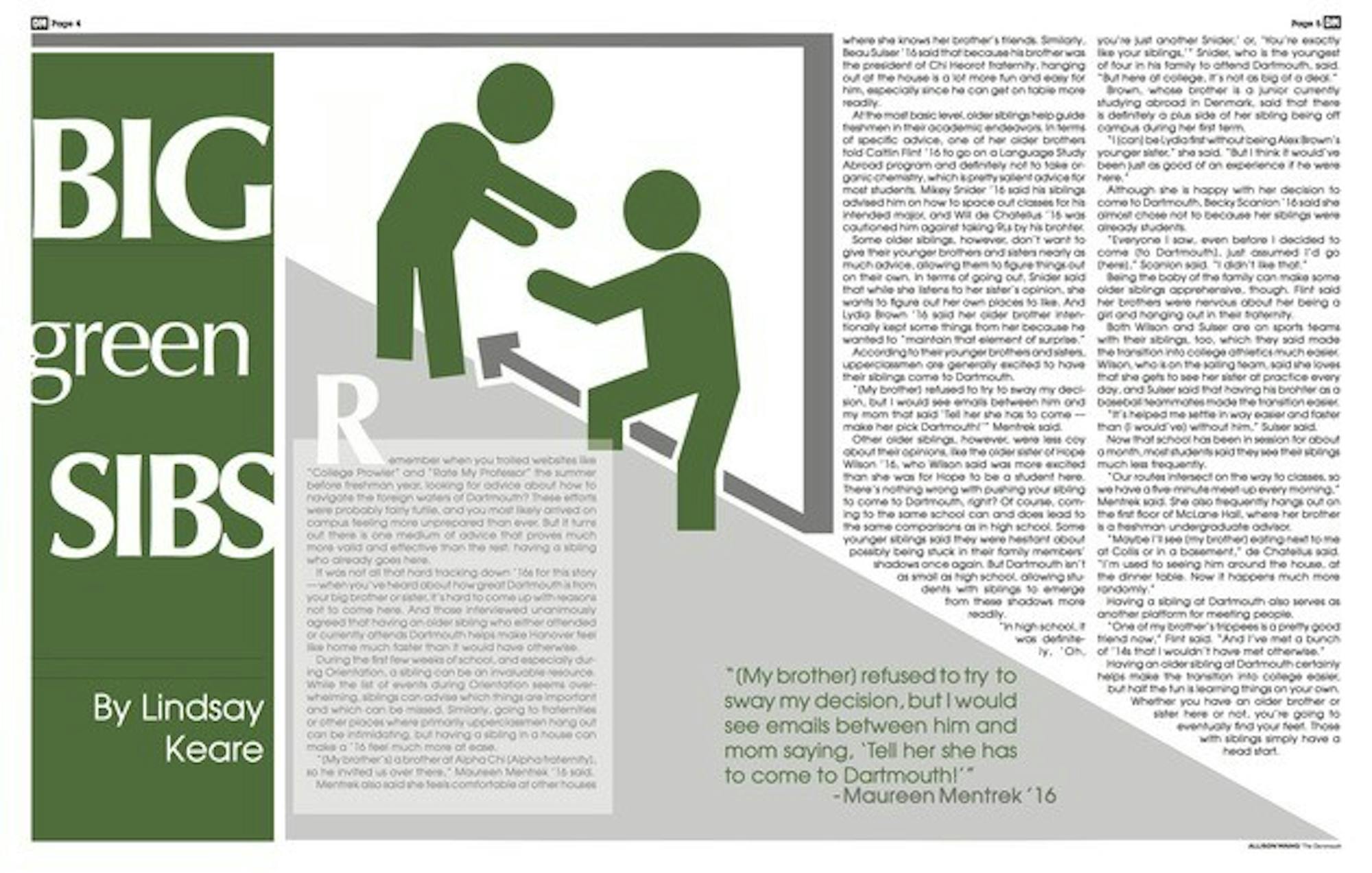It was not all that hard tracking down '16s for this story when you've heard about how great Dartmouth is from your big brother or sister, it's hard to come up with reasons not to come here. And those interviewed unanimously agreed that having an older sibling who either attended or currently attends Dartmouth helps make Hanover feel like home much faster than it would have otherwise.
During the first few weeks of school, and especially during Orientation, a sibling can be an invaluable resource. While the list of events during Orientation seems overwhelming, siblings can advise which things are important and which can be missed. Similarly, going to fraternities or other places where primarily upperclassmen hang out can be intimidating, but having a sibling in a house can make a '16 feel much more at ease.
"[My brother's] a brother at Alpha Chi [Alpha fraternity], so he invited us over there," Maureen Mentrek '16 said.
Mentrek also said she feels comfortable at other houses where she knows her brother's friends. Similarly, Beau Sulser '16 said that because his brother was the president of Chi Heorot fraternity, hanging out at the house is a lot more fun and easy for him, especially since he can get on table more readily.
At the most basic level, older siblings help guide freshmen in their academic endeavors. In terms of specific advice, one of her older brothers told Caitlin Flint '16 to go on a Language Study Abroad program and definitely not to take organic chemistry, which is pretty salient advice for most students. Mikey Snider '16 said his siblings advised him on how to space out classes for his intended major, and Will de Chatellus '16 was cautioned him against taking 9Ls by his brother.
Some older siblings, however, don't want to give their younger brothers and sisters nearly as much advice, allowing them to figure things out on their own. In terms of going out, Snider said that while she listens to her sister's opinion, she wants to figure out her own places to like. And Lydia Brown '16 said her older brother intentionally kept some things from her because he wanted to "maintain that element of surprise."
According to their younger brothers and sisters, upperclassmen are generally excited to have their siblings come to Dartmouth.
"[My brother] refused to try to sway my decision, but I would see emails between him and my mom that said Tell her she has to come make her pick Dartmouth!'" Mentrek said.
Other older siblings, however, were less coy about their opinions, like the older sister of Hope Wilson '16, who Wilson said was more excited than she was for Hope to be a student here. There's nothing wrong with pushing your sibling to come to Dartmouth, right? Of course, coming to the same school can and does lead to the same comparisons as in high school. Some younger siblings said they were hesitant about possibly being stuck in their family members' shadows once again. But Dartmouth isn't as small as high school, allowing students with siblings to emerge from these shadows more readily.
"In high school, it was definitely, Oh, you're just another Snider,' or, You're exactly like your siblings,'" Snider, who is the youngest of four in his family to attend Dartmouth, said. "But here at college, it's not as big of a deal."
Brown, whose brother is a junior currently studying abroad in Denmark, said that there is definitely a plus side of her sibling being off campus during her first term.
"I [can] be Lydia first without being Alex Brown's younger sister," she said. "But I think it would've been just as good of an experience if he were here."
Although she is happy with her decision to come to Dartmouth, Becky Scanlon '16 said she almost chose not to because her siblings were already students.
"Everyone I saw, even before I decided to come [to Dartmouth], just assumed I'd go [here]," Scanlon said. "I didn't like that."
Being the baby of the family can make some older siblings apprehensive, though. Flint said her brothers were nervous about her being a girl and hanging out in their fraternity.
Both Wilson and Sulser are on sports teams with their siblings, too, which they said made the transition into college athletics much easier. Wilson, who is on the sailing team, said she loves that she gets to see her sister at practice every day, and Sulser said that having his brother as a baseball teammates made the transition easier.
"It's helped me settle in way easier and faster than [I would've] without him," Sulser said.
Now that school has been in session for about a month, most students said they see their siblings much less frequently.
"Our routes intersect on the way to classes, so we have a five-minute meet-up every morning," Mentrek said. She also frequently hangs out on the first floor of McLane Hall, where her brother is a freshman undergraduate advisor.
"Maybe I'll see [my brother] eating next to me at Collis or in a basement," de Chatellus said. "I'm used to seeing him around the house, at the dinner table. Now it happens much more randomly."
Having a sibling at Dartmouth also serves as another platform for meeting people.
"One of my brother's trippees is a pretty good friend now," Flint said. "And I've met a bunch of '14s that I wouldn't have met otherwise."
Having an older sibling at Dartmouth certainly helps make the transition into college easier, but half the fun is learning things on your own. Whether you have an older brother or sister here or not, you're going to eventually find your feet. Those with siblings simply have a head start.




